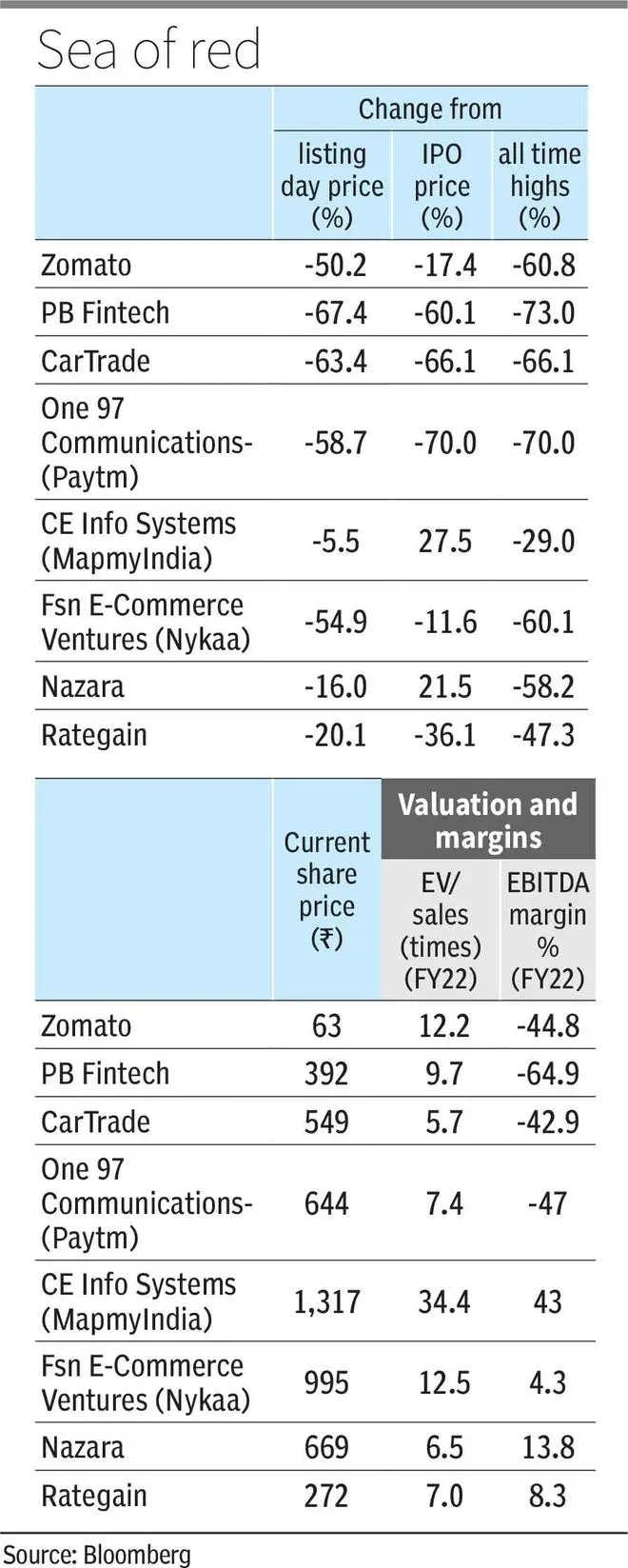Warren Buffet famously said, ‘Price is what you pay, value is what you get.’ Exuberant investors of new age companies are learning this lesson the hard way.
An analysis of new age companies that listed during the IPO boom of 2021 indicates that every single stock is below its listing day price and investors who jumped on to the bandwagon then would have lost money over the last year.
Purge of irrationality
In our bl.portfolio edition dated Dec 19,2021, we had cautioned investors about the over-hyped valuation of new age companies.
Many of these companies were trading at a whopping 40-60 times EV/Sales then.
Every single company in the list is down from its listing day price, some of them sharply. With exception of CE Info Systems (MapmyIndia) and Nazara Technologies, quite a few are way down from their IPO prices as well.

This comes at a time when the domestic benchmarks have held forte despite a crash globally.
What the future holds
While the shares have corrected 30-70 per cent from their all-times highs, valuations have corrected even more, driven by price fall as well as growth in revenues since listing.
From trading at 15-60 times EV/Sales, the stocks now trade in the range of 5 to 35 times.
For instance, PB Fintech is now trading at 10 times sales versus peak of 60 times.
Paytm and Nykaa have corrected from around 50 times sales to 8 and 12 times respectively.
So, with valuations moderating, is the pain over for new age stocks? Maybe not.
For companies like Paytm, PB Fintech and Nykaa, the shares could see more pressure as one year lock-in period expires for pre-IPO investors in November.
When lock-in for Zomato investors expired this July, the shares came under pressure, tumbling over 20 per cent in just few days as some early-stage investors pressed hard on the exit button. While the stock has seen a rebound of 50 per cent from lock-in expiry lows, the start of the rebound also coincided with a positive update from the company.
The company, soon after the days of all-time lows in share price, reported results and guided for an earlier-than- expected time frame for reaching adjusted EBITDA break-even. This got the markets excited for a while.
On the other hand, the shares of CarTrade saw no such rebound since expiry of lock-in in August and is in fact even lower now.
Thus, whether other stocks will see a rebound post pressure from lock-in expiry in the absence of positive updates, is a wait and watch.
Another aspect that investors need to factor is that just because shares are down a lot, it does not mean they are cheap and offer value.
With some of the new age companies still unprofitable at the EBITDA levels, they have a long way to go. Many of the companies have given guidance of reaching ‘adjusted EBITDA profitability’ (a term fancied by markets) many quarters from now.
After adjusted profitability comes the challenge of reaching normalised EBITDA profits and from there company has to deliver profits at the PAT level. Thus, truly sustainable PAT appear years away for most of these companies and is not a certainty.
Investors can take a cue from the US markets which were not favourable to new-age stocks in the last year. A good example is Snapchat. It’s valuation, peaked at over 30 times sales and the stock has corrected 88 percent from those levels now. It is 40 per cent down from its IPO price. Sustained profitability continues to elude the company.







Comments
Comments have to be in English, and in full sentences. They cannot be abusive or personal. Please abide by our community guidelines for posting your comments.
We have migrated to a new commenting platform. If you are already a registered user of TheHindu Businessline and logged in, you may continue to engage with our articles. If you do not have an account please register and login to post comments. Users can access their older comments by logging into their accounts on Vuukle.